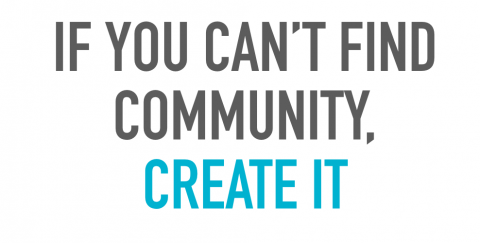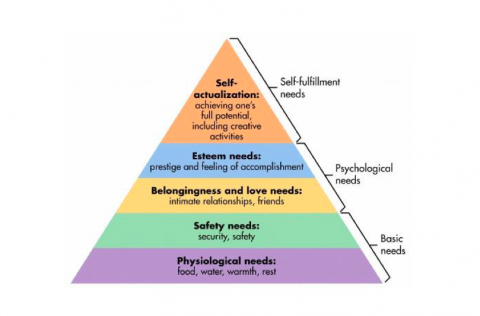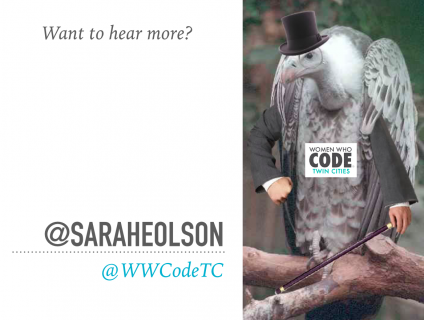RWDevCon 2017 Inspiration Talk: Creating Community by Sarah Olson
The Director of Women Who Code Twin Cities, Sarah Olson, shares what she’s learned about building communities that are inclusive and welcoming. By Sarah E Olson.
Sign up/Sign in
With a free Kodeco account you can download source code, track your progress, bookmark, personalise your learner profile and more!
Create accountAlready a member of Kodeco? Sign in
Sign up/Sign in
With a free Kodeco account you can download source code, track your progress, bookmark, personalise your learner profile and more!
Create accountAlready a member of Kodeco? Sign in
Contents
RWDevCon 2017 Inspiration Talk: Creating Community by Sarah Olson
30 mins
What I’ve Learned About Building Community
Throughout all of this, what have I learned?
There might already be communities you don’t even know about, so it’s really important to do some research and figure out who’s out there. Think about the communities you’re already involved in, and what you like and dislike about them.
The best way to figure out what you want from a community is to see what’s out there and go, “Mm, I like that thing, but I don’t like that.” Think outside the box a little bit. For example, here’s my family on our trip to Florida:
We were like a tiny, little community. We have lots of great feelings attached to that community, love and inclusion, and feeling welcome. Can I extend those feelings to my other community somehow?
There are a lot of really strange communities out there. One I found out about last week on Reddit is a subforum called Birds with Arms where people Photoshop arms on to birds.
It’s amazing and you should go look at it.
Even with all these communities out there, sometimes you can’t find what you’re looking for and you need to create it yourself.
One of the events I attended last year was Collision Conference and they offered free tickets to women in technology, but they didn’t have any way for us to actually connect once we were there, so it still felt really isolating. So we made our own event. We basically flagged down any women we could find at the conference and said, “Hey, we’re meeting at this time.”
We actually made an activity where we put up boards with post-its and said, “Okay, how can we help improve this in the future?” We gave that to the organizers at the end of the conference. Then someone actually wrote up something on Huffington Post about us going rogue.
When you’re creating your own community, it’s really important to be deliberate about what you’re doing. Really think about your mission and your vision. Think about who is included in your community, but most importantly who is excluded.
With Women Who Code, you can kind of tell from the name that we’re focusing on women, not not-women. Then we’re focusing on people who code, but we wanted to make sure that we were being very inclusive with the term women, so we had to put some language in our meet-ups to make sure that anyone who identifies as a woman felt comfortable and welcome attending. We really wanted to make sure that that was as inclusive as possible.
Sometimes members contact us and they’re like, “Well, I don’t know how to code yet.” We’re very open about that too, so sometimes those names can get in the way, but it’s really important to put that out there as, “Yes, please. You’re included as well.” Still, you have to draw a line somewhere. Someone is going to get excluded from your community, so think about the language you use.
Think about the location that you’re meeting in. Are there transit options so people can get to your meeting if you’re doing something in person? Is there access for people in wheelchairs? What ages are you targeting? We’re only looking at adults, but there are lots of groups for girls too. What experience level? We get lots of questions on that.
As a leader, it’s really important to keep things manageable. It’s easy to get overwhelmed. There’s a lot of work (or there can be) to being a leader, so grow slowly to make sure you can keep up with things. I have tons of ideas and I get really excited about them, but I have to keep in mind that I really can only commit to one a month.
Eventually, you’re going to have to grow your leadership team if your community is successful. I’ve recently added another leader to help me out with a lot of the work that I’m doing.
It’s important to know when to ask for help, but it’s also important to be careful about who you’re adding to your team. Lots of leaders or potential leaders have reached out and said, “I’m really excited about doing this,” but they never actually attended an event, or they’ll show up once and then not come back, but still really want to be a leader. It seems like some people are more interested in the title than actually doing the work, so it’s important to vet people. Find leaders with strengths where you have weaknesses. Make sure you’ve got everything covered.
Alignment is very critical. Having a shared vision and a plan forward will help save you a lot of drama. I’ve seen this happen in other groups where they’ve got a huge leadership team and no one can agree on what they should do or where they should go, and it’s really difficult to get anything done.
Community is about sharing. I mean, that’s the whole point. A community has a common goal or interest and you want to share that with other people, so it’s important that if you see another community that your members would benefit from, even if it kind of overlaps with yours, tell them about it.
Don’t be territorial. You’re trying to help people find a place where they feel like they belong, so give that to them. Collaborate with other communities when you can. I try to do as many events with other groups as I can to try and offer a larger community and make a bigger impact.
Remember that diversity makes you stronger. Even though you have this shared common interest, make sure that you’re getting differing opinions in there. You don’t want to focus it too small and miss out on some of the great diversity you could have in our group. Being inclusive is really hard work. There are lots of different opinions on how you should do things and the right terms you should use, and it can feel really daunting to misspeak or use the wrong term. Just focus on being respectful and listen to people when they point things out, and apologize if you did something wrong.
Everyone messes up. It’s okay.
An important thing to think about is what you’re going to offer your members. If you look at the Hierarchy of Needs:
At the bottom, you’re pretty sure most of your community has food and water and shelter. Hopefully you don’t have to worry about that; maybe you do, but at our community the next level up is about safety. That’s something I’m already pretty concerned about, so the first thing I care about is making sure we have a safe space.
One of the things I’ve done is to ask recruiters not to attend our events because it can make some people uneasy, and I’m doing all I can to make sure people feel comfortable attending.
It’s also important to think about your own needs. What are you getting out of this? Is it making you happy? Are you fulfilled?
The one thing I struggle with most is feedback. People don’t want to tell me anything, so it’s like pulling teeth. “Is this good? Do you like this? Would you like something else?” People don’t really know. They know what they don’t like, but it’s really hard to schedule around that, so we’ve had to come up with some creative ways of gathering feedback.
One of the things we’re doing this year is we have a challenge, like New Year’s resolutions. As in, do all these things and earn points, and at the end of the year we’ll give out really cool prizes. Part of the challenge is when they submit the entry to get points, we ask a few questions like, “Did you like this event? What more could you see?” We’re starting to get a little bit more feedback that way. It seems like the more you ask, after a while people will finally start offering up little tidbits.
The most important thing to me is: how do you want your community to feel?
How do you want your members to feel? As Ash said, feelings matter. How would it feel to be a new member, and walk in the door and not know anybody? Maybe you’re brand new to coding or maybe you’re really experienced. How do all of those different members feel?
Try and put yourself in their shoes.
This Maya Angelou quote really stands out to me. “I’ve learned that people will forget what you said, people will forget what you did, but people will never forget how you made them feel.”
This, I think, is why feelings are really so important.
I’ve got a lot I could talk about on this subject and I just have a short time today, so if you want to talk any more about it or have any other questions, feel free to contact me. My Twitter is @saraheolson, and then Women Who Code Twin Cities is @WWCodeTC.
Thank you.















